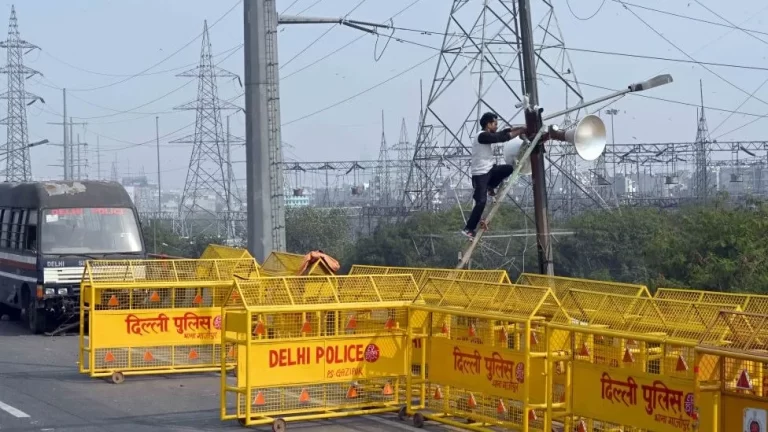Thousands of protesting farmers are marching from neighbouring states to India's capital Delhi to seek assured prices for their crops
In 2020, farmers had camped at Delhi borders protesting against controversial agricultural reforms. The year-long protest – in which dozens died – was called off after the government agreed to repeal the laws.
Now the farmers have hit the streets again saying their key demands still haven't been fulfilled.
Police in Delhi have sealed the borders on three sides of the city, in an attempt to avoid a repeat of 2020 when protesting farmers hunkered down for months, blocking national highways that connect the capital to its neighbouring states. The movement was seen as one of the biggest challenges to Prime Minister Narendra Modi's government.
Two rounds of talks between farm union leaders and federal ministers have failed to break the deadlock.
Farmers are asking for assured floor prices – also known as minimum support price or MSP – which allows them to sell a majority of their produce at government-controlled wholesale markets or mandis. They are also demanding that the government fulfil its promise of doubling farmers' income.
The march comes just months before the general elections in which Mr Modi's Bharatiya Janata Party (BJP) is seeking a third term in power. Farmers form one of the most influential voting blocs in India and experts say the government would try not to alienate them ahead of the polls.
On Monday, federal ministers held a six-hour-long meeting with farm union leaders. The two sides reportedly came to an agreement on some of the demands, including the withdrawal of cases registered against protesters during the 2020 agitation.
But there was no consensus on the MSP. In 2021, after the farm laws were repealed, the government had said it would set up a panel to find ways to ensure support prices for all farm produce. But the committee is yet to submit its report.

In the meantime, authorities have deployed barricades, fenced the border with barbed wire and added cement blocks to stop protesters from entering the capital.
Police have also prohibited large gatherings in the city, including at borders points between Delhi and the neighbouring Uttar Pradesh and Haryana states through which the farmers are expected to reach the capital.
In Haryana, the BJP-led state government has suspended internet services in seven districts until Tuesday.
Over 200 farmer unions are participating in the march. “We will move peacefully and our objective is that the government listens to our demands,” Sarvan Singh Pandher, general secretary of the Punjab Kisan Mazdoor Sangharsh Committee, told the ANI news agency.
Farmers' and trade unions have also announced a rural strike on 16 February during which no agricultural activities will be carried out. Shops, markets and offices in all villages will be closed while farmers will block major roads across the country.
— CutC by bbc.com


